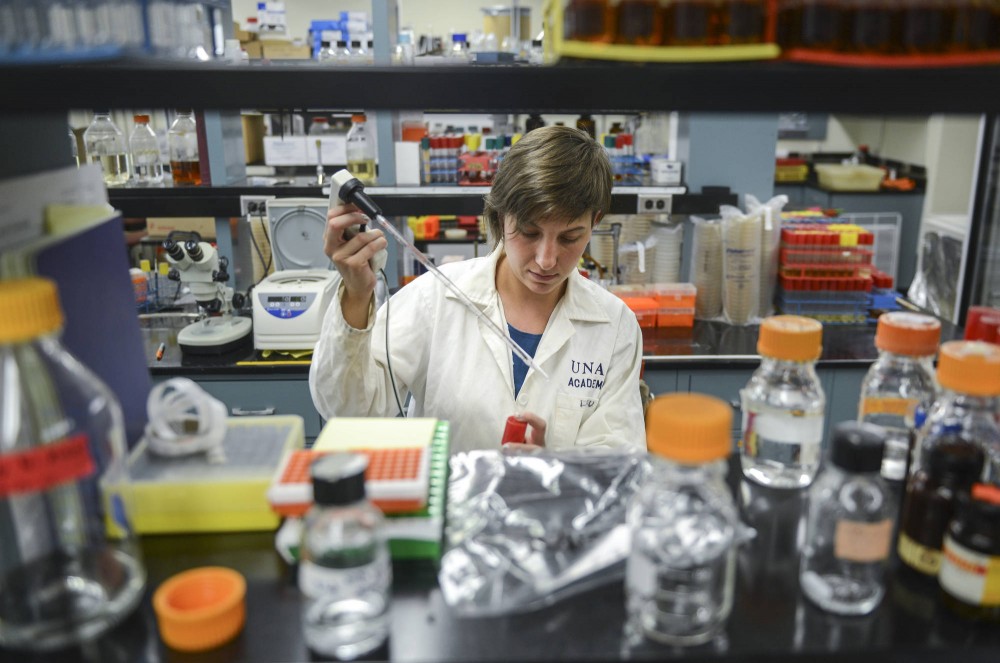Katherine Liu and Maria Rebolleda-Gomez work side by side in a laboratory studying how biology and philosophy can intertwine in their research.
Both applied for the same fellowship to conduct their research, but only Rebodella-Gomez received the grant, leaving Liu to struggle with a lack of money and resources to do her work.
Liu’s experience conducting interdisciplinary work isn’t unique for University of Minnesota graduate students, as many barriers, including insufficient funding and few facilities, can make doing cross-departmental research difficult.
But now, University administrators are pushing for graduate students to do more interdisciplinary work in the coming year, and that could mean more funding in the near future for researchers like Liu.
“Although there’s a lot of discussion about interdisciplinary programs, I think in the last 10 years there’s been a loss of support for [them],” said Sue Galatowitsch, co-chair of the Interdisciplinary Advisory Committee.
Rebolleda-Gomez was one of only 15 doctorate students to receive the Interdisciplinary Doctoral Fellowship this year, which will help her continue her research.
But for other students like Liu who haven’t received funding through grants and fellowships, doing research can be more challenging.
“It’s great that I can get funding [from the college], but the amount of fellowships that are offered to do interdisciplinary work is not enough,” she said.
Opportunities for students who want to do interdisciplinary research are typically made available through fellowships, grants or interdisciplinary degree programs, or through working with a faculty member within the student’s field.
Some funding issues stem from the way money is allocated to interdisciplinary programs, Galatowitsch said. The Graduate School reorganization of 2010 changed the way the school manages its funding for cross-program research, she said, which made it difficult to fund students who want to do that type of research.
“While there is a lot of enthusiasm for [interdisciplinary work], the reorganization just really was a major setback,” she said.
Galatowitsch said it can be especially difficult to provide support for students conducting cross-program research because some departments may not want to fund students outside of their program.
Interim Vice Provost for Faculty and Academic Affairs Allen Levine said making interdisciplinary work a priority at the University includes not only increasing funding and grants, but also support from all parts of the institution.
“It involves all of us at the University — the students, the staff, the faculty, all of the researchers — in terms of working together,” he said.
The University is now hoping to increase its support for cross-program work in the coming school year, building on the Graduate School’s initiatives from the past year to aid students who do interdisciplinary work, said Vicki Field, director of the Office of Interdisciplinary Initiatives in the Graduate School.
Solving global issues
The heightened focus on interdisciplinary work is common throughout universities nationwide as they work to tackle large-scale issues like climate change and poverty.
Cross-program work is also included as part of the University’s strategic plan, which includes addressing global issues.
Acting Vice Provost and Dean of Graduate Education Sally Kohlstedt, a member of the strategic planning team focused on building curriculums that can solve global problems, said interdisciplinary work is a vital piece of the puzzle.
Kohlstedt said cross-program research allows students to work with other experts outside of their fields to understand how their work can combine multiple disciplines to solve complex issues.
“Some [problems have] to be solved with those multiple points of views,” she said.
Rebolleda-Gomez, who is in the ecology, evolution and behavior department, said her interdisciplinary work makes her connect with her peers, which helps her evaluate what questions her research should answer.
“It’s also another way to look at things so it makes you think more critically about your own research,” she said.











